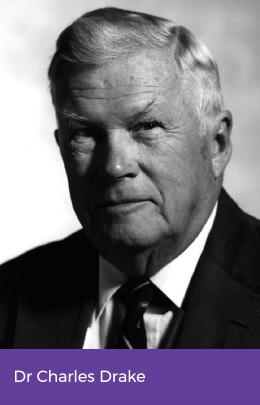Dr Rodney Allan
BSc(Med) MB BS (Hons), FRACS, CCINR
Home > Our practice > Dr Rodney Allan > Overseas fellowship
Dr Rodney Allan
BSc(Med) MB BS (Hons), FRACS, CCINR
Home > Our practice > Dr Rodney Allan > Overseas fellowship
Charles Drake Memorial Fellowship
Dr Allan was selected for – and completed – the prestigious Charles Drake Fellowship in Cerebrovascular Surgery and Endovascular Therapy in London, Ontario, Canada between 2004 and 2006.
This unique fellowship is named after a world renowned Canadian neurosurgeon who pioneered treatment for what had been untreatable cerebral aneuryms on the basilar artery and in the posterior circulation. Patients were referred from all over the world for treatment of difficult vascular (blood vessel) problems in the brain by this great surgeon.
The same centre also developed and headed the study that proved the benefit of carotid endarterectomy in preventing stroke.
Dr Drake worked closely with the neuroradiologists in his department, and encouraged development of new, less invasive, ways of treating blood vessel abnormalities in the brain.

Clinical Training
Dr Allan is one of a limited number of neurosurgeons around the world who have advanced training in both microsurgical treatment of blood vessel abnormalities in the brain and also endovascular treatment of these disease processes.
This means that Dr Allan is uniquely able to offer an opinion as to the best treatment for a particular disease based on his experience of providing both treatments and is able to assist the patient in making the best decision as to the type of treatment to pursue.
Whilst overseas, Dr Allan gained experience in surgical repair of aneurysms (‘clipping’), excision of arteriovenous malformations (AVMs), carotid endarterectomy and brain bypass surgery (EC-IC bypass).
Dr Allan completed extensive endovascular training including treatment of aneurysms (‘coiling’), AVM’s (“onyx” and “glue”), carotid artery angioplasty and stenting, embolisation of tumours and for epistaxis, vertebroplasty, intracranial angioplasty and stenting, thrombolysis (for ‘brain attack’ or stroke) as well as all other aspects of endovascular practise.
This training reached (and exceeded) the standards required for Senior membership of the ASITN (American Society of Interventional and Therapeutic Neuroradiology) (now the Society of Neurointerventional Surgery or SNIS) of which Dr Allan remains a member.
Dr Allan was also able to gain further experience in skull base surgery including treatment of complex tumours such as acoustic neuromas, and also experience in epilepsy surgery and in particular, surgery in vital areas of the brain performed whilst the patient is awake (‘awake craniotomy’).
Minimal access spinal techniques and spinal arthoplasty had been pioneered (in Canada) in London Ontario, and Dr Allan was able to broaden his experience in these areas also – including attendance at numerous courses on such topics as spinal instrumentation, arthoplasty and ‘keyhole’ surgery.
Charles Drake Memorial Fellowship
Dr Allan was selected for – and completed – the prestigious Charles Drake Fellowship in Cerebrovascular Surgery and Endovascular Therapy in London, Ontario, Canada between 2004 and 2006.
This unique fellowship is named after a world renowned Canadian neurosurgeon who pioneered treatment for what had been untreatable cerebral aneuryms on the basilar artery and in the posterior circulation. Patients were referred from all over the world for treatment of difficult vascular (blood vessel) problems in the brain by this great surgeon.
The same centre also developed and headed the study that proved the benefit of carotid endarterectomy in preventing stroke.
Dr Drake worked closely with the neuroradiologists in his department, and encouraged development of new, less invasive, ways of treating blood vessel abnormalities in the brain.

Clinical Training
Dr Allan is one of a limited number of neurosurgeons around the world who have advanced training in both microsurgical treatment of blood vessel abnormalities in the brain and also endovascular treatment of these disease processes.
This means that Dr Allan is uniquely able to offer an opinion as to the best treatment for a particular disease based on his experience of providing both treatments and is able to assist the patient in making the best decision as to the type of treatment to pursue.
Whilst overseas, Dr Allan gained experience in surgical repair of aneurysms (‘clipping’), excision of arteriovenous malformations (AVMs), carotid endarterectomy and brain bypass surgery (EC-IC bypass).
Dr Allan completed extensive endovascular training including treatment of aneurysms (‘coiling’), AVM’s (“onyx” and “glue”), carotid artery angioplasty and stenting, embolisation of tumours and for epistaxis, vertebroplasty, intracranial angioplasty and stenting, thrombolysis (for ‘brain attack’ or stroke) as well as all other aspects of endovascular practise.
This training reached (and exceeded) the standards required for Senior membership of the ASITN (American Society of Interventional and Therapeutic Neuroradiology) (now the Society of Neurointerventional Surgery or SNIS) of which Dr Allan remains a member.
Dr Allan was also able to gain further experience in skull base surgery including treatment of complex tumours such as acoustic neuromas, and also experience in epilepsy surgery and in particular, surgery in vital areas of the brain performed whilst the patient is awake (‘awake craniotomy’).
Minimal access spinal techniques and spinal arthoplasty had been pioneered (in Canada) in London Ontario, and Dr Allan was able to broaden his experience in these areas also – including attendance at numerous courses on such topics as spinal instrumentation, arthoplasty and ‘keyhole’ surgery.



